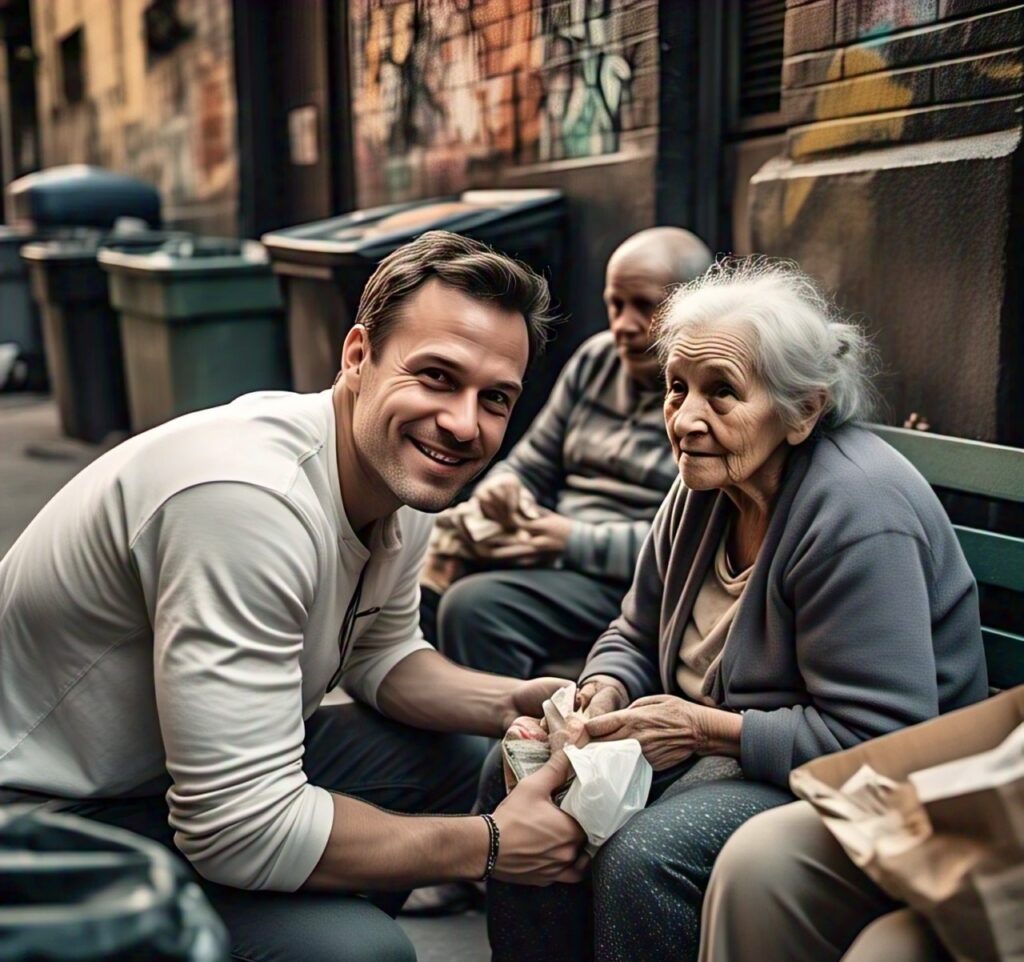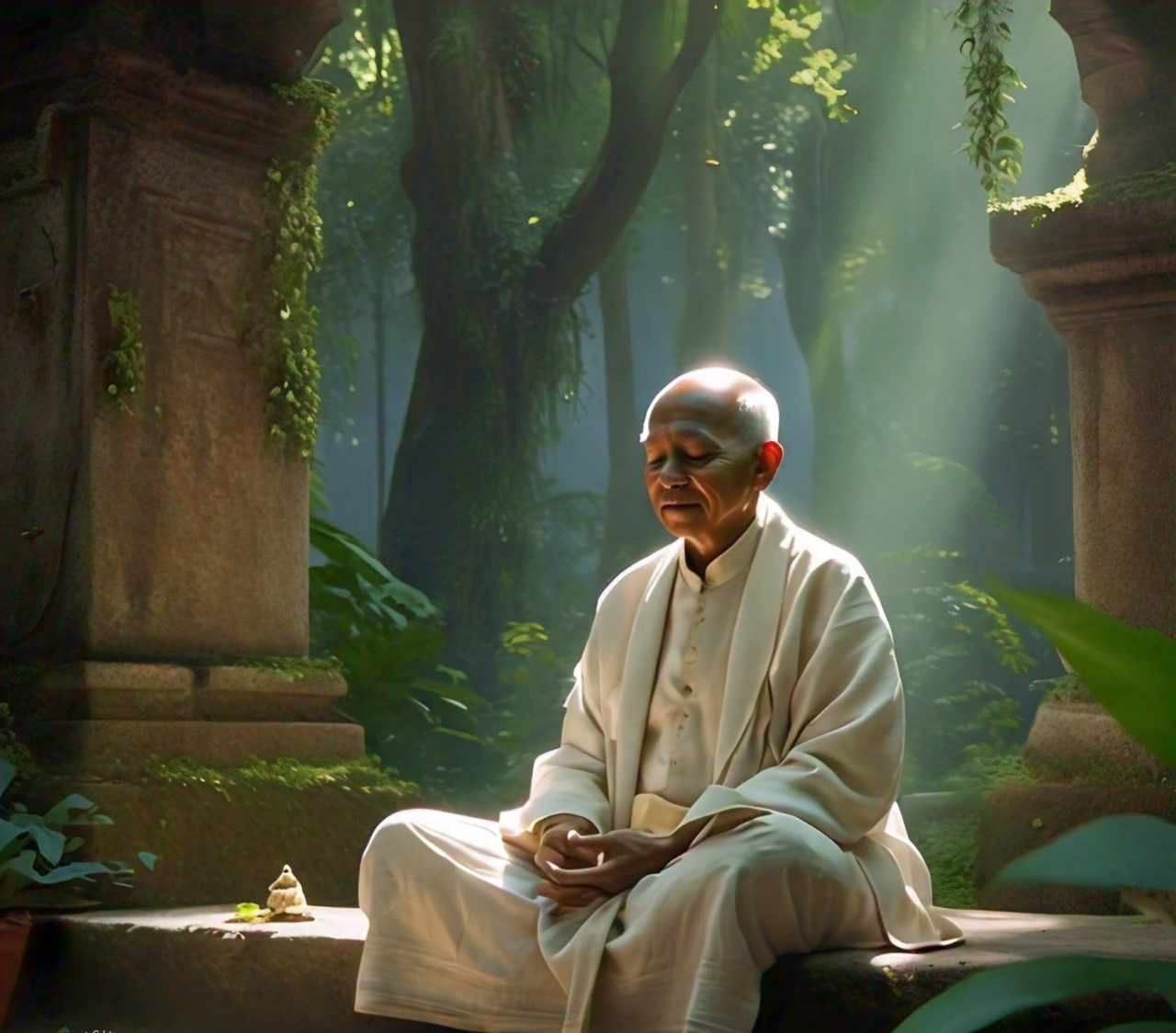I used to think I was a “good” person; you know the type that holds the door open, texts back quickly, donates to charities, gives to friends, listens without interrupting, and yeah, I liked being kind and I liked being known for it even more, but then something unsettling crept in quietly, sometimes even very loud in my ear or rather I should say heart, but mostly quietly, and like a whisper behind every act of my generosity: Am I doing this for them or for me?
There it was and just like that; the uncomfortable question that stripped the shine off my shiny deeds. Quick question, have you been there? Have you ever had that thought? Have ever onced asked yourself:
- Was my kindness really just a well-dressed version of self-interest?
- A clever way to be liked, respected, needed?
- Did I give to others only because it made me feel good, look good, sleep better at night?
- Was my good deeds just an extension of my own selfishness?
I did ask myself these questions and suddenly, for most of the time the good deed I had done had a shadow over them.
I noticed how my compliments were sometimes designed to win people over; how I volunteered for praise and not for purpose; how I had felt resentful when my “selfless” acts went unnoticed and to be even very very honest, they were not selfless to begin with, they were strategic. And today for some reason as I write this article, I am wondering: Can a good deed still be good if it is rooted in ego? And maybe, just maybe you have felt this too. Maybe you smiled generously, then checked who was watching. Maybe you have helped, but kept the receipt, waiting for karma, credit, or connection, and just before you maybe start to feel any condemnation, It is not evil, it is human. My point is that we can learn to do better, yes there are places for business, where you trade favours and good deeds and certainly expect them back in double, triple and multiple folds or as profits and if that is what you are doing, know that, that is what you are doing and don’t call it what it is not.
And if we are brave enough to ask this question: Is my goodness truly about and for others, or just a reflection of my selfishness? Then and only then can we start to get closer to a more honest, grounded kind of kindness.
Not the kind that is shallow, parades itself while wearing a mask, but the kind that knows its own shadows, and chooses to give anyway and wholeheartedly giving and rooting for others and leaving behind the illusion of selflessness.

The Illusion of Generosity: Are We Ever Truly Selfless?
I don’t know about you but while I was still very young and growing, or on a second thought, I am sure you too, while very young and still growing up, you heard a lot stories of selfless heroes; those who run into burning buildings, donate their last dollar, or spend their lives serving others. It is inspiring! It is beautiful! It feels like the highest form of humanity!
But here is the thing or should I say the catch: Even the most noble acts often come with a reward, whether we like to admit it or not.
Sometimes it is internal, a sense of purpose, fulfillment, peace, and sometimes it is external, recognition, praise, social approval and sometimes, it is just relief: That we did something instead of nothing.
As I write this article I can vividly remember giving money to a homeless man once and walking away feeling proud, until I took a pause and realized I was thinking more about how good I felt than whether I had truly helped him; the question again was this: Was I feeding him or feeding my ego?
Psychologists have a term for this: Psychological egoism; the idea that everything we do, even what seems generous, is ultimately motivated by self-interest and that stings a bit, doesn’t it? Be honest!
But maybe it should not sting or at least I believe it should not sting; this is what I think the real, main and BIG issue is, but first what it is not, it is not whether we feel good doing good, we ought to feel good; it is whether we are honest about it, honest about the good we did, honest because we want to truly be of help and ease things for the other person.
Because generosity is not about erasing the self, but about reflecting the self and showing that it is about choosing to care, even when the lines between self and others are blurry.
And I hope that statement does not confuse you, plus it reminds me of an article I wrote:
Self-awareness can be a strange thing; it’s like trying to catch a glimpse of yourself in a mirror that keeps moving fast. Sometimes, I think I understand who I am, and then, the moment I try to analyze it, I lose it; I’m wondering if you ever feel that way, do you? Like when you sit down to reflect, or practice self-introspection, but the more you observe yourself, the less sure you are of whether you’re seeing the real you or just the version of you that knows it’s being watched?
This paradox, like almost every other paradox, fascinates me. I can remember that when I was younger, I tried to journal, trying to map out my thoughts and emotions to understand myself better, but at times, I would wonder: Am I writing down what I truly feel, or am I subconsciously creating and organizing my thoughts just for this sake and because I know they’ll be read back? Even if it’s just by me? And many times this is the same way we act in front of others; there’s always that voice in the back of our minds monitoring what we say, how we move, how we’re being perceived. And I wonder when do I stop performing? Even when I am alone, and am I still playing some kind of role?
Continue Reading: The Paradox Of Self-Awareness: The Observer And The Observed
How Helping Others Can Feed the Ego
There is a part of me that lights up when I do something nice and it is not always about being thanked; it is about feeling like a good person, like I matter, like I am needed, and that is where things start to get complicated.
Because on the surface, helping someone looks noble, but underneath, it can quietly inflate the ego. Each of our good deeds becomes a subtle mirror that reflects back a polished version of who we want to be: Generous, kind, compassionate.
But what happens when no one sees it? When there is no applause, no acknowledgment, no warm thank-you? Does the act still feel as satisfying?
In the past I have caught myself not being so happy because someone didn’t recognize my “help,” and that reaction exposed something uncomfortable: Maybe I was not just trying to help them, maybe I was also trying to build me, my image, my story, my worth.
In a way, my kindness became a currency; I was not giving it freely; I was investing it and hoping for a return in the form of appreciation, admiration, or a clearer conscience.
This does not make me or you a bad person; it makes us human; it means we crave connection, validation, meaning, but when the ego drives the engine of our good deeds, we honestly have to ask: Am I really giving or am I just trading?
And the hardest part is that most of the time, we do not even realize we are doing it.
Kindness as Currency: The Psychology Behind Giving
As we have already talked about, doing good feels good and science backs this up. Studies show that acts of kindness release dopamine and oxytocin, our brain’s feel-good chemicals, and they call it the “helper’s high.”
We’re wired to feel rewarded when we give, it is just basic biology; it is psychology and it is survival, but this is the thing, in that feel-good loop, something subtle happens: Kindness becomes currency. Not with dollars and in any other currency you can think of, but with something just as valuable, status, approval, self-worth, or even the soothing thought that we are “not like the others.” We give, and whether we admit it or not, we sometimes expect something back and not necessarily something material, but like you have already read, maybe a little recognition, a better seat at the moral table and a quiet nod from the universe.
It is called reciprocal altruism, the idea that we help because, consciously or unconsciously, we expect help in return and like we have already said, it is a survival strategy that is rooted into our evolution, something like, in fact, not something like but exactly this: You scratch my back, I will scratch yours and it works, or least to an extent it keeps societies intact, but it is not exactly selfless.
And then there is social signaling, where our good deeds, especially the public ones, become performances. We post about giving blood, we share the charity we donated to, we announce our good deeds, even in subtle ways too, because and again on some level, we want to be seen as good. And then our kindness starts to look less like a gift and more like a brand.
None of this makes giving wrong, but and again, it forces us to confront a harder question or maybe not so hard if you are an honest person: Am I being kind or am I just making a transaction I have convinced myself is generosity?
Virtue Signaling or Virtue Living?
We can both agree that for some people it is easy to be good when people are watching and it is harder when no one is, because we live in a world where every action can be broadcast, liked, and validated in real time, and while there is nothing primarily wrong with sharing good deeds, it can raise awareness, inspire others but there is a fine line between living your values and advertising them.
That line is called virtue signaling. Virtue signaling is when we display moral behavior to gain approval, not necessarily because it is rooted in deep conviction. It is generosity with a hashtag as I would like to call it, empathy with a selfie, and volunteering with just enough lighting to prove we care, and I have been there, I have done it myself too.
When doing good becomes more about being seen as good, it starts to lose its soul, but virtue living is very different from this, it is quiet and It does not always look noble. Sometimes it is staying up late with a friend in pain, sometimes it is admitting you messed up and trying to make it right and sometimes it is giving and never getting credit for it.
It is not always Instagrammable and I hope that word is correct, Lol, but it is real. And here is an uncomfortable truth: You can do the right thing for the wrong reasons and sometimes, you can do it for both.
The challenge is not to scrub your intentions perfectly clean; it is to ask yourself, in every moment of giving: Am I showing off my goodness or am I showing up for someone else?
Intent vs. Impact: Does The Motivation Matter?
I think for the past two months or more there is something about paradoxes that has been fascinating me and I will do well to share one of the link to an article I wrote sometime ago about paradoxes, but before then here is one the paradox that keeps me up at night: If someone is helped by my action, does it really matter why I did it?
Let us say I donate to a food bank because I want to feel better about myself; that food still feeds a hungry person; the impact is real and the result is good. But then again I ask myself: Is it less noble because I did it to feel good and it made me feel good?
Stay and walk with me here because this is where things get tricky: Do our motives define our morality, or do our outcomes?
Many philosophers have debated this and people still do till this day and people will continue to do so. Some argue that pure intent is essential, that goodness must come from a selfless place, and others argue that the impact is what matters most; that even if your reasons are messy, if someone’s life is better because of your actions, that is enough.
But this is what I have personally come to notice in my own life: When my motive is driven more by ego than empathy, the act might look the same, but I feel different.
It Is more transactional, weak and hollow, and when my giving comes from a place of connection, when I am tuned into someone else’s pain or need, it feels quieter, but deeper, more human and less acting.
So yes, motivation does matter, not in the “Am I a bad person or a good person?” sense but in the quality of the connection we create; in how we show up for others; in how we stay after the applause fades away and when no one is watching. Because at the end of the day, good deeds are not just about what we do; they are about how present, how honest, how wholehearted we are when we do them. And that can not be faked, not even for a cause, or at least I do not think so myself.
Again remember I just said that: Some argue that pure intent is essential, that goodness must come from a selfless place, and others argue that the impact is what matters most; that even if your reasons are messy, if someone’s life is better because of your actions, that is enough. You know what this reminds me of? Another article I wrote about good intentions.
The intention to engage in good acts can fail, and if our claim of good intention, when acted upon, can fail, it points out the principle that there is no merit in good intentions unless they are acted on.
It is essentially saying that certain people might have good intentions but not act on them, which can lead to negative outcomes, or their noble intentions may result in unintended, negative outcomes.
One theory is that people tend to want to act in a good way (good intention) but don’t take any action at all. The delay, wrong action, and inaction don’t produce a good result and, in reality, could lead to a bad outcome. In this case, the best intentions without good and correct actions are, at best, ineffective and worse, detrimental.
Another way to look at this concept is that people can conceal their intentions behind good intentions. They could commit an act that has a negative result but claim they were doing something good. For instance, someone may do something in the interest of only a few people, which has a negative impact on a vast number of people. Often, a person feels morally certain they’re doing what’s right and deems any “collateral damage” acceptable to obtain what they see as the greater good. In other words, they may or may not have bad intentions yet get bad results.
Continue Reading: The Road to Hell Is Paved with Good Intentions – Means What Exactly?
When Good Deeds Go Toxic: Manipulation Through Kindness
Not all kindness is kind. Sometimes, it is a form of control dressed up in compassion; I have seen it and I have done it. That favor I offered, not just hoping but looking forward to them feeling indebted; the gift that I gave, so I could bring it up later; it was all a “selfless” act that came with invisible strings attached.
And this is another uncomfortable truth: Kindness can be weaponized; it can be used to create guilt, guilt trips, to earn loyalty, to gain the upper hand in a relationship. When giving becomes a tactic rather than an offering, it crosses into manipulation, and the worst part is that it is still disguised as generosity.
It is very very very possible that you can give a lot of your time, help, and even money to someone you say you care about or say you are in love with, and at first glance, it can very much feel like love, honestly it can, until you realize that every act came with an expectation, sure there are expectation in love and we expect at least the same energy and thoughtfulness if not more, but this is where I am heading to with this; if sometimes they do not respond with the same intensity, or if they disagree with you, and your kindness turns cold; it was never unconditional or maybe you do not know the basic of how to love someone. Again my point here is that your kindness was conditional and then became a contract they never agreed to sign.
Ang again like I already clearly stated, there is a place of expectation in love, but looking back and in the mirror, I have done the same, I have given with a secret scoreboard in my mind, waiting for the return and feeling very off when it never came. Again there is a fine line between expectation in loving someone and your love being a form of manipulation and I hope you get it, maybe I will do well to write an article on that.
But true generosity is not a transaction; it does not demand repayment, and when it does, it is not generosity; it is leverage, a good deed with a hidden invoice. This kind of toxic kindness damages relationships; it makes people question every act of care, every gesture of support; it turns love into obligation, any yes again, please do not get me wrong, love is an obligation that ought to be freely expressed, but certainly not a contract-type of obligation, and here we are again, I hope I am not confusing you. I am saying that the kindness that demands is not genuine and that is not goodness, it is manipulation in disguise.
So the real deal is not just doing good, it is letting it go after you have done it; no hooks, no conditions and no tallying. Because the moment we expect something back, we stop giving and we start trading.
A guilt trip involves causing another person to feel guilt or a sense of responsibility to change their behavior or take a specific action. People can use guilt to influence how others feel, think, and act.
This could mean that the person is relying on someone else’s guilt. Other times, it might lead to feelings of guilt and responsibility that are not justified.
Guilt-tripping can be used to communicate indirectly.
Even if you have done nothing wrong, it is possible for the other person to suggest that the problem is yours and that you can help them make their unhappy feelings clear.
It can also be quite effective. You’re more likely than not to do your best to alleviate their suffering if you feel guilty.
Whether intentional or not, Guilt-tripping prevents healthy communication conflict resolution and often triggers feelings of resentment, frustration, and annoyance.
Continue Reading: What Is Guilt Trip And How To Spot It, Call It Out, And Shut It Down
Can Self-Interest and Selflessness Coexist?
So after all this questioning of motives, ego, and manipulation, you might be wondering: Is true generosity even possible? If every good deed is touched by self-interest, does that mean we are all just dressing up our egos in kindness? Maybe but maybe that is not the full story.
What if self-interest and selflessness are not enemies? What if they are just two parts of the same very human experience? Because yes, helping others does make us feel good; it can soothe our wounds, affirm our value and make us feel connected in a world that can feel cold, but that does not automatically make it fake.
It makes it human and the truth is that most of our motivations live in the gray, I say that to say this; we give because we care, we also give because it gives us something, meaning, peace, a moment of light. That does not make the act less beautiful, in fact, it might make it more powerful because it acknowledges the full spectrum of why we give, and we still choose to do it anyway.
Generosity is not about being perfect; it is not about erasing the self; it is about using the self, your time, your energy, and your heart in service of something beyond just your own reflection. So maybe we stop trying to be selfless, and instead strive to be aware. And I hope I am not confusing you here too, Lol, because it makes clear sense in my own head as I write this article.
My point is that, let us learn to be aware of our intentions, aware of our impact, and aware that the best kind of good often comes from a place that is honest and real. Not a performance, not usually loud, just a quiet decision to show up for someone else, and yes, maybe even for ourselves.
Read Also: Beyond the Giving: The Heart of True Generosity
Read Also: The Test Of Prosperity: Why Most Fail And How To Pass
Read Also: The Passion Paradox: Obsessed or Inspired
Conclusion
At the end of the day, you should do what I do and reflect and know what matters more is whether you are willing to face that truth to look at your motives not with shame, but with curiosity. To ask yourself not “Am I selfless?” but “Am I sincere?”
Because true generosity is honesty, purity as much as you can express it; it is about presence. It is about giving without pretending to be above the need for connection, meaning, or even recognition. It is about letting go of the shallow and choosing to help even when your ego is in the room with you.
So yes, your kindness might come with a shadow, but it is still light and with that light you learn to cast out the shadows, and when your light of honesty and kindness without any string attached reaches someone, it lifts them even if it was for a moment, and with that we can learn to do more.






1 comment
This is a thought-provoking question! Some might argue that even altruistic acts can have underlying self-serving motivations, like feeling good about oneself or seeking validation. Others believe true selflessness exists, driven by empathy and a genuine desire to help.
Most of the time we do things because we seek validation from others and want to be recognized which is a selfish act caused by self deceit. We want to look good in the eyes of others but our genuine intentions are hidden in our instincts.